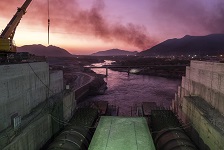International Crisis Group (ICG) advises Egypt to abandon its current aggressive public diplomacy opposing Ethiopia’s plan of filling the Great Ethiopian Rainnaisance Dam (GERD).
“Cairo should abandon its current aggressive public diplomacy, which creates perceptions in Ethiopia that it seeks to halt the GERD project altogether and maintain an inequitable status quo. That approach inflames Ethiopian public opinion and thus reduces Addis Ababa’s room to offer concessions,” ICG said in its brief report released today.
“Egypt should also accept that Ethiopia has the right to develop Blue Nile projects upstream of the GERD that would reduce inflows into the dam. An agreement should contain a dynamic element allowing for renegotiation of minimum releases from the GERD as circumstances change over time,” it said.
“Given decades of acrimony, domestic pressures and climate volatility, Nile issues will undoubtedly remain contentious for some years to come. But the parties now have a short window of opportunity to veer away from a looming confrontation and build the foundation for future cooperation,” ICG said.
“Any deal on the GERD would mean creating a joint institution through which the three countries would share data on rainfall and river flows, and coordinate reservoir levels, thereby formalising cooperation and building trust,” it said.
It said that Egypt, Ethiopia and Sudan all have strong incentives to adopt such an approach. “For Egypt, no deal would mean that the government looks weak, as it has opposed unilateral filling. Additionally, it would leave itself with limited information about Ethiopian plans for filling and operating the GERD, putting itself in a disadvantageous position to manage its own water resources,” it said.
“For Ethiopia, a deal would mean honouring its 2015 commitment to agree on plans for filling the reservoir while avoiding increased diplomatic pressure. For Sudan, cooperation means getting into a better position to benefit from the GERD’s electricity and regulated releases,” according to ICG.
With only weeks to go before Ethiopia begins storing water, and given the mistrust among the parties, it will be difficult to strike a comprehensive deal before filling or, barring that, to revisit the idea of an interim deal that would at least buy more time, according to ICG.
“Regardless of which approach the parties eventually take, they and their outside supporters must make every effort to reach a compromise on the outstanding issues before both water levels in the dam and tensions rise significantly,” ICG suggested.

